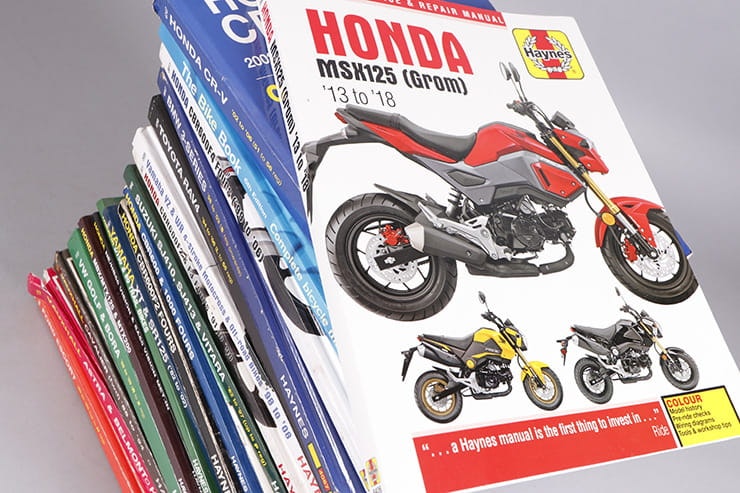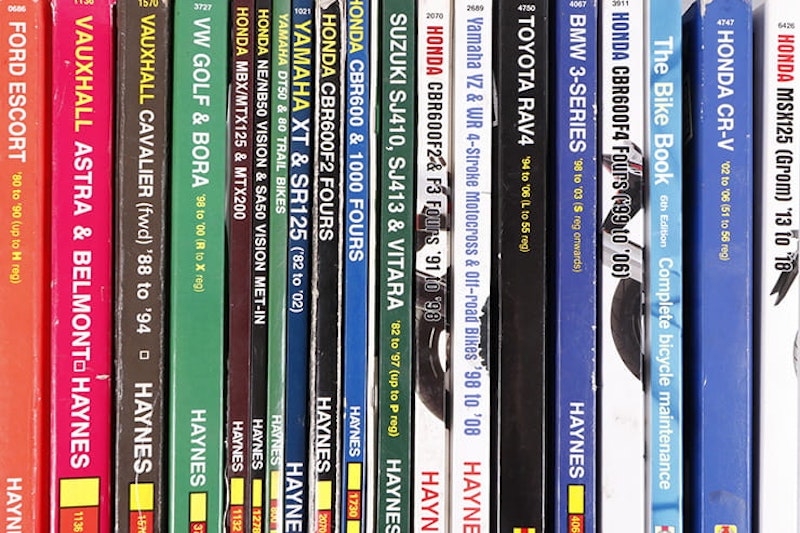The one tool every motorcyclist must own
By John Milbank
Consumer Editor of Bennetts BikeSocial
10.09.2018
It’s mainly been about saving money, but it’s also been about pride. I’ve been riding for 22 years, and driving for 29 (I know, the wrong way around really), and since my first vehicle – a MkII Ford Escort – I’ve always done my own servicing.
Dad got me started – we’d spend hours in the car park down the road, under the bonnet of my Escort, then my Astra, then my Cavalier. If we got really stuck, Dad’s mate was a professional mechanic, so we could tow the car over there. Like the time I put the water pump bolts in the wrong way around and sheared one of them off in the head. I use a torque wrench now.
We were never alone though – we always had a Haynes service manual to hand.
When I bought my first motorcycle (a Honda CBR600FM), I figured I should have it serviced by an expert; I was concerned that something that fast should only be maintained in a ‘proper’ garage.
Shortly after its first service there, it blew a spark plug out. I could hear it blowing, but they said it was fine. Until it wasn’t. Stupidly, I took it back to the same garage and paid them to fix it.
When I was left with a box of broken fairings and snapped forks after crashing it a few months later, I figured I might as well have a crack at rebuilding it myself. When the helicoil fitted by that garage came out while removing the spark plugs, I finally twigged that, ultimately, a bike is no different to a car when it comes to maintenance – it’s just got fewer brake calipers and it’s easier to get at everything. It’s still a lump of metal that holds oil, brake pads, spark plugs and filters.
Note that Bennetts Rewards members can now save 40% off all Haynes manuals!
I’ve bought a Haynes manual – where available – for every almost vehicle I’ve owned
Can you still service a modern motorcycle?
Bikes are getting more and more complex – there’s no denying it – but they still require the same basic servicing – fluids, filters and consumables.
Besides yearly services on the dozens of bikes (and cars) I (and my wife) have owned, I’ve changed clutches, replaced engines and rebuilt suspension. But I can’t do everything – I acknowledge my limits so do still use a specialist when it comes to bucket and shim valve clearances or Ducati belt changes.
I’d make a terrible mechanic as I take far too long over my work. And I’m not perfect – I’ve put things in the wrong way and I’ve broken things. But they’re my mistakes, and I only have myself to blame. And I learn from them.
A Haynes manual spells out exactly how to do all your own routine maintenance
Is your bike worth less without a service history?
I keep receipts for everything when servicing my vehicles, and I also work off a service sheet that I design based on the handbook – that way I know I’ve done all the work, and so does the next owner.
We tend to own older vehicles, and when we come to sell them, I make sure to show all the receipts and documents to prove the work’s been done.
While my KTM 1050 Adventure has been under warranty (I bought it a year old), I have been taking it to KTM for servicing, but being the control freak that I am, I’ve always managed to get myself into the workshop to watch what’s being done. Fortunately, the mechanics have always been superb; I’ll deign to allow them to spanner my machine.
And my Honda MSX125? As I now have a Haynes manual for it, I’ll service that myself and not worry about the warranty; I’m tinkering with it so much anyway. And valve clearances on that are a doddle.
I’ve never been bartered down when selling any car or bike with my own service records (even by a dealer), but you’ve got to expect to show people your workshop. I once went to look at buying a rebuilt Category C insurance write-off Yamaha XJR1300 – it looked great, but had a front-end wobble at speed. I figured it could be misadjusted head-races, but when the guy who’d put the bike back together went at the steering stem nut with a large adjustable spanner, I walked away. Tool snobbery? Maybe, but I have my own way of doing things, and I’ll stick with them, thank you very much.
Ironically, when I buy a bike I do try to look for a full service history. My advice? If your bike’s fairly new and you don’t intend to keep it for a long time, get that service book stamped by a pro. If you’re going to be keeping it for several years, you might just save a good chunk of cash, some of which can offset the relatively small drop in price for not having those inked-in pages. Especially if you keep on top of cleaning your bike; present something to a buyer that is clearly very well loved.
Having a reference for all the torque settings can save a lot of hassle…
Why not just use the internet?
Not every vehicle I’ve owned has had a Haynes manual available for it, but over the years I’ve realised that the processes are generally very similar, regardless of brand. Sometimes though, I’ve needed to scour forums to find the source of my woes. The hive mind can really help you solve an issue quickly.
And it can also get you into an awful lot of trouble.
Sometimes its mischievousness, sometimes it’s ignorance, but the unlimited free advice online is not always good advice. It’s not always thoroughly researched. It’s not always thoroughly correct. You need to check, double-check and cross-check, because all too often, when one person says something on a forum, two others pick up on it and requote it. It can lead to an exponential growth in misinformation.
Try finding the actual answer to a problem on a BMW 318 estate beyond “yeah, it’s the MAF”. The Mass Air-Flow sensor is the internet’s go-to answer, but the problem was actually the crank-position sensor.
I prefer to use a Haynes manual, as I’ve never come across a serious mistake. They’re not always perfect – I once spent half a day stripping out the centre console of a car to get the gear knob off, only to find I could have unclipped it in 10 seconds. But I did find out how to get the stereo out.
I’d rather drag a book under my car in the rain than a lap-top, and when I’m stripping the swing-arm out of a bike I’m not bothered if I kneel on a paper-based manual. I’d be pretty gutted if I did that to my iPad. And they don’t respond well when you knock a bottle of brake fluid over them. You can subscribe to online manuals through Haynes, which is a great way to get quick and easy access to workshop advice, but I still prefer seeing the pages of my manual getting gradually more oily.
Maybe it’s a bit obsessive, but making my own service sheets ensures I don’t miss a job
How much can you save doing your own servicing?
It depends how many tools you already have. My Dad passed a lot to me, but I’ve still bought a lot. Then it comes down to how much the dealer servicing would cost.
My wife loves big-engined, old, luxury cars. Her current V6 Mercedes cost £2,500 two years back, and has done over 160,000 miles now; I save an absolute fortune by servicing that myself. I buy most of the service parts at Euro Car Parts – just make sure you never buy over the counter – there’s always a discount code on the website’s home page, so click and collect.
I get all my oil – for bikes and cars – from Halfords… they’ve often got multi-buy deals online (click and collect again), and if you’re insured by Bennetts you can get 10% off everything. Very handy for other motorcycle consumables like spark plugs.
Using some serious guestimation, I reckon it’s pretty realistic to say that I’ve saved an average of at least £500 a year through doing my own servicing and repairs on all of our vehicles. Over 29 years, that’s £14,500. Enough to buy a brand new bike. Or two, three or four used ones that I can service myself, saving more money and therefore allowing me to buy even more!
A Haynes manual builds confidence, it helps you understand your bike far more intimately, and it saves you cash. It’s probably the most important tool in your workshop.
Note that Bennetts Rewards members can now save 40% off all Haynes manuals!

